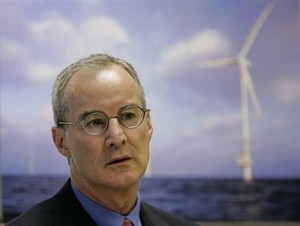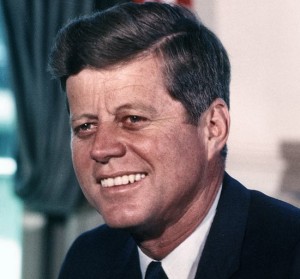
Tweet
![]()
On Friday, March 25,2011, Cape Wind LLC‘s CEO Jim Gordon spoke at Columbia University about the long delayed project. When he started the project, back in 2001, the Europeans were 10 years ahead of us. Today the Europeans are 20 years ahead of us, and the Chinese too are years ahead of us.
Mr. Gordon quoted Theodore Roosevelt, IV, as saying, “I live on the Cape. If we don’t do this, in 50 years the Cape will be under water.” Cape Cod’s highest point is about 300 feet above sea level so Mr. Roosevelt was exaggerating. His home may wind up under water, but at least some of the Cape will be one or more islands. Speaking of islands, Nantucket, which in 2006 had the highest median property values in Massachusetts, rises some 30 feet above sea level. If sea level rises 30 feet, Nantucket will get washed away.
Mr. Gordon said, “Cape Cod has the most polluted air in New England. When you harness the wind you get clean electricity: No arsenic, lead, mercury, thorium, uranium, or zinc or carbon dioxide like you get from burning coal. No barges of oil that can spill. No radioactive waste like you get from nuclear power. Last year we read about the coal mine disaster in West Virginia. Then the Deepwater Horizon. Now we’re reading about the disaster in Japan. With wind there is no possibility of a disaster, Zero.”
And, he added, “Fossil fuels are a finite resource. New England has neither coal, oil, or natural gas – but there is a tremendous amount of wind. When you factor in the costs of storms and sea level rise – you would think it’s a no-brainer.” The question is not “Can wind power provide base line capacity?” But “How can wind power provide base line capacity.”
Mr. Gordon told how during a trade mission to China, one of his engineers was grilled about wind power, offshore wind, engineering, costs, and siting. After the end of the grilling his hosts said “we read Cape Wind, by Wendy Williams and Robert Whitcomb. We would never allow that here.” In 2009 China built a 100 mw wind farm off the coast of Shanghai – completed the project quickly. By the end of 2010 they had 41.8 gigawatts of nameplate capacity wind power – enough for about 45 million Americans (wikipedia).
Williams and Whitcomb tell how the project has been delayed. The book talks about a powerful elite that has had privileges for so long they believe those privileges to be their rights. They fought hard and fought dirty to preserve those privileges. They will eventually lose. Either Cape Wind will be built or Cape Cod and Nantucket will go the way of Atlantis, or maybe both. But if or when the Cape and Nantucket are flooded those towers will still stand tall above sea level.
The hardest thing people in power must do listen when told “there are some key facts you need to consider – you need to reverse course.” This is the key difference between a leader and a tyrant. A leader will listen and change course; a tyrant will ignore or try to silence as “disloyal opposition” those who dare to disagree.
Williams and Whitcomb write about the Puritan heritage of New England. “The city was a genuine culture hearth for literature, philosophy, education, psychology, and other progressive ideas. Boston Puritans had a historical tradition of respect for the printed word, and all children were supposed to learn to read. On the other hand, Boston Puritans presided over a rigid, closed society that insisted on strict conformity to a set of sometimes rather harsh rules. Individualism was firmly prohibited. Just because reading was a good thing, it didn’t necessarily follow that freethinking was acceptable” (pg 48-49). This intolerance for individualism and strict conformity, they suggest, is still a major force in “polite society” on the Cape, even for those who were barred from “polite society” in Boston, Newport, or Providence.
 Like good investigative reporters, Williams and Whitcomb name names. Jack Welch of General Electric, Doug Yearly of Phelps Dodge and Marathon Oil, Bill Koch, forced out of Koch Industries by his brothers, Charles and David, David McCullough, man of letters but not vision, Lambert heiress Rachel “Bunny” Lambert Lloyd Mellon, and the politicians Bill Delahunt, Edward Kennedy, and Robert F. Kennedy, Jr. Their slogan: “Save Our Sound,” with the accent on “Our.”
Like good investigative reporters, Williams and Whitcomb name names. Jack Welch of General Electric, Doug Yearly of Phelps Dodge and Marathon Oil, Bill Koch, forced out of Koch Industries by his brothers, Charles and David, David McCullough, man of letters but not vision, Lambert heiress Rachel “Bunny” Lambert Lloyd Mellon, and the politicians Bill Delahunt, Edward Kennedy, and Robert F. Kennedy, Jr. Their slogan: “Save Our Sound,” with the accent on “Our.”
From 2001 to 2003, Walter Cronkite sided with the opponents of Cape Wind. Then, after a correspondence with George Woodwell, an environmental scientist from Woods Hole, and a subsequent conversation with Jim Gordon, he changed his position to favor the wind farm.
It’s hard to believe that Senator Ted Kennedy, who fought against offshore drilling, and Robert F. Kennedy, Jr., who fights for clean water, also fought against Cape Wind. But they did. According to Williams and Whitcomb, In Oct. 2002, Robert F. Kennedy, Jr., on the National Pubic Radio show “The Connection,” joined the fossil fuel lobby and his blue blooded sailing buddies to proclaim. “I would not put a wind farm in the Boston Common or Yosemite.” Williams and Whitcomb also note that a few months later, Robert Kennedy, Jr. told Dennis Duffy, one of Cape Wind’s lawyers, “I can’t believe you think you’re going to do this. I learned to sail out there. You’re going to have a fight every step of the way.” (Pg 118-124). His “Op-Ed piece in the New York Times, 12/16/05, said “I favor wind power, but not here.”
“In the summer of 2003, Jim Liedell, a retired utility executive and avid wind-farm supporter, saw Ted Kennedy in Hyannis. Can you tell me why you’re opposed to this wind farm?” Liedell asked… ‘But don’t you realize,’ Kennedy said indignantly, ‘that’s where I sail.’ ” (Pg 127-128)
I know that the Kennedys, like the Clintons and the Bushes are human. But for a career environmentalist to choose coal and oil versus wind … unconscionable. It led to opposition by other environmentalists, particularly those affiliated with Riverkeeper. This smells like the roses of Camelot were dipped in the oil that spills into Buzzards Bay when tankers run aground or rinsed in the waste that pours from the bilges of the yachts on the water parks of the rich and powerful.
Robert Kennedy and other professional environmentalists can argue that they are for pristine wilderness – but there is none left. Radioactive pollutants from Japan’s Fukushima Dai-ishi plant are circulating over New Jersey. Plastic and toxics from California are floating in the “Great Pacific Garbage Patch,” the once-clean waters of the Pacific over the Horse Latitudes (a toxic fruit that look like food to turtles and other aquatic fauna).
The real question is how do we turn on the lights? Wind and solar or fossil fuel and nuclear? Conservation – negawatts – is important. But while a well insulated building uses less energy than a non-insulated building, LED light bulb use a lot less energy than an incandescent light – but they still use energy. When you flip the switch electrons must flow.
Cape Wind’s slogan was not “The Sound Belongs to Everyone.” It was “It’s Not the View, It’s the Vision.”
John Kennedy, in his inaugural address, (here) said “If a free society cannot help the many who are poor, it cannot save the few who are rich.” As is often the case with great leaders, Kennedy’s words reach across space and time. Cape Wind will help everyone by generating power without greenhouse gases, by reducing air pollution and the cost of electricity, and by generating electricity in a sustainable manner from fuel free – and waste free – natural processes. It will also help the few who are rich by preserving their property. Clearly the opponents of Cape Wind forgot John Kennedy’s words as they fought to prevent Jim Gordon from building a wind farm near where John Kennedy sailed.
Visionaries must think globally and act locally.
—
First in a series that explores Offshore Wind and Politics.
Index to the series: